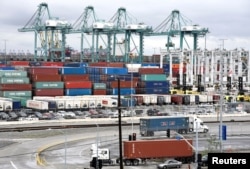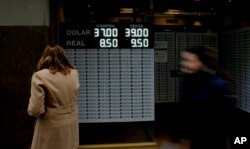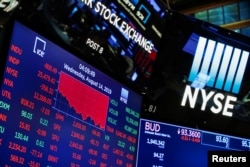The world enjoyed a synchronized pickup in 2011, but now it appears to be heading for a downturn. In the past, governments could rely on central banks to cushion the fall and shorten any slump by stimulating growth. This time around, though, analysts warn there might be little central banks can do.
Economists doubt there's much that can be done in terms of monetary policy to stave off a downturn. With short-term interest rates so low already, central banks don't have the firepower they once possessed to get economies back on track. As the economic challenges pile up — from the U.S.-China trade war to the seemingly never-ending Brexit saga — business confidence and investment is falling off.
Consumers are now the main drivers of global growth, according to JPMorgan Chase, an American bank, which says global retail sales volumes rose 4.8 percent in the last quarter. That uptick in consumer spending is largely thanks to tight labor markets, but manufacturers likely will soon retrench when it comes to hiring, which in turn would prompt households to curb spending.
Export-led economies are the ones feeling the pinch. France, which exports less than Germany, is still looking strong with factory activity picking up. But hiring is falling off in Germany, the economic powerhouse of Europe, and factory activity in the European Union as a whole contracted for the seventh consecutive month in August.
Manufacturing contracted last month at the fastest rate in seven years in Brexit-mired Britain. In the U.S., the Institute for Supply Management's factory index suggests manufacturers are starting to cut jobs in expectation of a slowdown.
"A meaningful recovery is unlikely given the ongoing struggles of global manufacturing," according to Andrew Wishart, an economist at Capital Economics.
Recession signs abound. In the United States, bond interest rates have "inverted," meaning shorter-term bonds are yielding a higher interest rate than longer-term ones. Traditionally that is seen as warning sign. In Europe, the German economy is shrinking, and so, too, is heavily indebted Italy. The British economy contracted last quarter by 0.2 percent amid fears about how it will break from the European Union, its largest trading partner.
And in Latin America, the large economies of Mexico, Brazil and Argentina continue to struggle.
It isn't just President Donald Trump looking toward central banks for some kind of preemptive action. Trump has tweeted more than 30 times in the last four weeks demanding the Federal Reserve significantly cut the effective funds rate — the interest rate that banks pay each other to borrow money. Expectations are growing the European Central Bank will soon ease monetary policy.
Interest rates
Federal Reserve officials will meet September 18 to decide what to do about interest rates. Boston Fed President Eric Rosengren already has come out to say cutting rates now would be a mistake, although there are signs the prime lending rate will be reduced.
Rosengren told the Washington Post the U.S. economy is still "relatively strong" and enjoying low unemployment, rising wages and consumer-led growth. He wants to delay interest rate cuts until there are clearer signs of economic distress, fearing premature intervention by the Fed now will mean that cuts will have little impact later on if a recession does emerge.
"You don't want to apply accommodation at a time when you don't need it, in part because you won't have it when you do need it and in part because there are side effects from pushing interest rates very low. It encourages people to take more risk," Rosengren told the newspaper Tuesday.
But some central bankers and economists worry that monetary-policy tools won't be sufficient this time as they have used up a lot of their firepower pulling the world out of the 2008 financial crash.
Speaking last month at the Federal Reserve's annual symposium at Jackson Hole, the governor of the Bank of England, Mark Carney, said easing monetary policy and interest cuts likely would not be enough to ward off a downturn.
In Europe and Japan, interest rates already are, in effect, negative. With central bank rates quite low everywhere, the fear is there isn't much to be expected from reducing them even further. So will governments take up the strain by cutting taxes to stimulate demand and boost their borrowing to spend on initiatives, such as investment in infrastructure?
There also are concerns on this front. Many countries are already mired in historically high public debt, having spent trillions on bonds as part of an effort to spur growth. Piling on more borrowing is risky, if gross domestic product doesn't increase. Currencies will start devaluing. Lenders will start demanding higher interest rates. An inflection point will be reached when there are diminishing returns.
Earlier this year, Mohamed El-Erian, chief economic adviser at Allianz, said, "Think of a car traveling on a bumpy road with no spare tires. You really don't want to have another blown tire."










